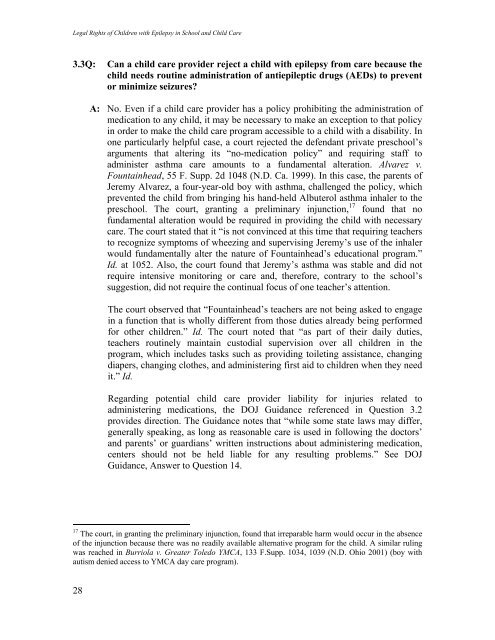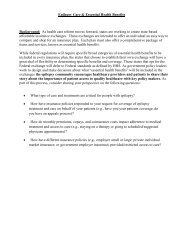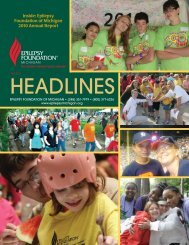Legal Rights of Children with Epilepsy in School & Child Care
Legal Rights of Children with Epilepsy in School & Child Care
Legal Rights of Children with Epilepsy in School & Child Care
You also want an ePaper? Increase the reach of your titles
YUMPU automatically turns print PDFs into web optimized ePapers that Google loves.
<strong>Legal</strong> <strong>Rights</strong> <strong>of</strong> <strong><strong>Child</strong>ren</strong> <strong>with</strong> <strong>Epilepsy</strong> <strong>in</strong> <strong>School</strong> and <strong>Child</strong> <strong>Care</strong><br />
3.3Q:<br />
Can a child care provider reject a child <strong>with</strong> epilepsy from care because the<br />
child needs rout<strong>in</strong>e adm<strong>in</strong>istration <strong>of</strong> antiepileptic drugs (AEDs) to prevent<br />
or m<strong>in</strong>imize seizures?<br />
A: No. Even if a child care provider has a policy prohibit<strong>in</strong>g the adm<strong>in</strong>istration <strong>of</strong><br />
medication to any child, it may be necessary to make an exception to that policy<br />
<strong>in</strong> order to make the child care program accessible to a child <strong>with</strong> a disability. In<br />
one particularly helpful case, a court rejected the defendant private preschool’s<br />
arguments that alter<strong>in</strong>g its “no-medication policy” and requir<strong>in</strong>g staff to<br />
adm<strong>in</strong>ister asthma care amounts to a fundamental alteration. Alvarez v.<br />
Founta<strong>in</strong>head, 55 F. Supp. 2d 1048 (N.D. Ca. 1999). In this case, the parents <strong>of</strong><br />
Jeremy Alvarez, a four-year-old boy <strong>with</strong> asthma, challenged the policy, which<br />
prevented the child from br<strong>in</strong>g<strong>in</strong>g his hand-held Albuterol asthma <strong>in</strong>haler to the<br />
preschool. The court, grant<strong>in</strong>g a prelim<strong>in</strong>ary <strong>in</strong>junction, 17 found that no<br />
fundamental alteration would be required <strong>in</strong> provid<strong>in</strong>g the child <strong>with</strong> necessary<br />
care. The court stated that it “is not conv<strong>in</strong>ced at this time that requir<strong>in</strong>g teachers<br />
to recognize symptoms <strong>of</strong> wheez<strong>in</strong>g and supervis<strong>in</strong>g Jeremy’s use <strong>of</strong> the <strong>in</strong>haler<br />
would fundamentally alter the nature <strong>of</strong> Founta<strong>in</strong>head’s educational program.”<br />
Id. at 1052. Also, the court found that Jeremy’s asthma was stable and did not<br />
require <strong>in</strong>tensive monitor<strong>in</strong>g or care and, therefore, contrary to the school’s<br />
suggestion, did not require the cont<strong>in</strong>ual focus <strong>of</strong> one teacher’s attention.<br />
The court observed that “Founta<strong>in</strong>head’s teachers are not be<strong>in</strong>g asked to engage<br />
<strong>in</strong> a function that is wholly different from those duties already be<strong>in</strong>g performed<br />
for other children.” Id. The court noted that “as part <strong>of</strong> their daily duties,<br />
teachers rout<strong>in</strong>ely ma<strong>in</strong>ta<strong>in</strong> custodial supervision over all children <strong>in</strong> the<br />
program, which <strong>in</strong>cludes tasks such as provid<strong>in</strong>g toilet<strong>in</strong>g assistance, chang<strong>in</strong>g<br />
diapers, chang<strong>in</strong>g clothes, and adm<strong>in</strong>ister<strong>in</strong>g first aid to children when they need<br />
it.” Id.<br />
Regard<strong>in</strong>g potential child care provider liability for <strong>in</strong>juries related to<br />
adm<strong>in</strong>ister<strong>in</strong>g medications, the DOJ Guidance referenced <strong>in</strong> Question 3.2<br />
provides direction. The Guidance notes that “while some state laws may differ,<br />
generally speak<strong>in</strong>g, as long as reasonable care is used <strong>in</strong> follow<strong>in</strong>g the doctors’<br />
and parents’ or guardians’ written <strong>in</strong>structions about adm<strong>in</strong>ister<strong>in</strong>g medication,<br />
centers should not be held liable for any result<strong>in</strong>g problems.” See DOJ<br />
Guidance, Answer to Question 14.<br />
17 The court, <strong>in</strong> grant<strong>in</strong>g the prelim<strong>in</strong>ary <strong>in</strong>junction, found that irreparable harm would occur <strong>in</strong> the absence<br />
<strong>of</strong> the <strong>in</strong>junction because there was no readily available alternative program for the child. A similar rul<strong>in</strong>g<br />
was reached <strong>in</strong> Burriola v. Greater Toledo YMCA, 133 F.Supp. 1034, 1039 (N.D. Ohio 2001) (boy <strong>with</strong><br />
autism denied access to YMCA day care program).<br />
28








